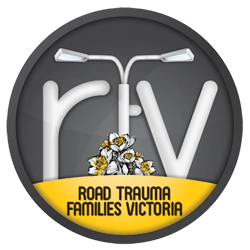A traumatic experience is any event in life that causes a threat to our safety and potentially places our own life, or the lives of others at risk. As a result, a person experiences high levels of emotional, psychological, and physical distress that disrupts their ability to function normally in day to day life.
https://www.betterhealth.vic.gov.au/health/healthyliving/trauma-and-teenagers-commonreactions
About RAW2ROAR Traumatised Teens Camp
As RTFV President/Ed Consultant, advocate and retired teacher/Head of Campus, I have supported many traumatised students and their families across Australia, who have lost a child or loved one due to road trauma. My experiences identify, that there is a lack of evidence based, trauma informed support/programs that recognise the unique needs, of traumatised youth.

RTFV advocate for Australian, trauma informed programs for youth trying to cope with trauma, grief and loss, with the aim of fostering self-esteem and instilling positive values by way of resilience-focused interventions. Our young people need 21st century strategies for moving beyond past trauma, to regulate their emotions, and how to cope with present and future challenges. Rebelling as a response to their trauma, loss and grief, places them in an ‘at risk’ category. They are vulnerable to finding ways to make their pain go away and detach from those close to them, as they think by doing so, the whole, horrible event will disappear.
Drugs, alcohol, truancy, risky behaviours, self-harm and homelessness (many families fracture because of their loss), are the result. I believe that it is hard enough to be a teenager without the added layers of trauma, grief and loss. Because they have trouble trusting, traumatised teens often have trouble asking for help. ‘Adults may have to offer assistance many times over and be willing to be rebuffed many times before their help is accepted. But when the stakes are so high, the difference a trusted relationship makes can be enormous.’ http://www.pamf.org/teen/life/trauma/tension/
Teenagers do not want, or agree, to participating in formal face-to-face counselling. They and their parents have shared often, during RTFV support visits, that the idea of sitting in a room with a stranger asking ‘stupid’ questions is ‘dumb’. RTFV seeks to change the status quo by providing an opportunity for counselling on their terms. RTFV have listened and heard what is needed and advocates strongly that it is time to make a change.
GOAL: RTFV, seek ongoing funding so that appropriate support, by way of a weekend camp, can be developed and made available to the identified cohort in relation to trauma grief and loss. There are many successful grief programs in Australia but, nothing that offers trauma, grief and loss to the youth cohort which are appropriate for their needs. Participants can connect with others/peers, who are trying to cope with a similar experience. An opportunity to be with peers and others who will listen, understand, and share hope or guidance when needed. They can identify that they are not on their own. Most importantly, they can have fun and be care free in a safe, understanding environment. It is hoped that they will leave with ‘strategies’ to assist their journey ahead knowing that they have solid trusting peer and adult mentors to rely on for help, any time.
RTFV has identified international ‘best practise’ programs and approaches that are successful and specific for traumatised teenagers and pre-teens. America is leading the way, with Europe taking their lead and implementing programs with some tinkering for geographical and cultural context. There is no limit to what can be done in Victoria and nationally. To do nothing is no longer an option. These young people deserve the best assistance possible. Through no fault of their own, their world, their life, has been destroyed leaving them lost, helpless and vulnerable, without a future, trying to cope day by day. https://moyerfoundation.org/
A best practise model
A successful program which can be used in any setting
Great resources for camp programs
Camp activities
APPROACH: It is important to understand the ways in which a teenager manages trauma, loss and grief so that appropriate, individualised support, can be implemented to help them. Teenagers handle trauma differently to younger children or adults. A younger child depends directly on their family, whereas many teenagers look to their peer group for support, which can be counter-productive. It is hoped that strong, positive friendships will be forged during the weekend camp. A second follow-up camp within a six month time frame will give opportunity for feedback and evaluation outcomes to be included and for the participants to share how they have used the strategies, skills and networking introduced during the first weekend camp.
The Camp venue of choice is the YMCA Camp in Anglesea. The location of the camp enables surf and bush activities in a Government approved, safe environment. Highly qualified and experienced youth counsellors, together with mental health professionals will be engaged to work with the participants. They will also be on hand for immediate support if needed. An outdoor program will be delivered by a contracted agency with activities to create group bonding, trust activities, canoeing, snorkelling, archery, bush adventure activities to mention a few.
VicPol members will also be invited to assist. Relaxation and meditation will also be included in group activities with opportunity for spiritual development. RTFV advocates for a Trauma, Loss and Grief weekend camp, at no cost to the effected families to provide:
- respite with lots of fun whilst learning important skills and strategies.
- potential long-term skill development, such as resilience towards new traumatic events and further achievements in life.
- skills to further reduce the impact of their traumatic memories
- greater self-confidence and self-belief
- reduction of both posttraumatic stress symptoms and anxiety, as well as an additional improvement in psychological adjustment.an understanding that when a family is affected by a crisis, everyone in the family will react in a different way.
- understanding distress reactions and their effect on family dynamics.
- friendships with like-minds who are also going through similar experiences and develop networks for support.
- positive self talk and relaxation strategies.
Police check and Working with Children Check are mandatory for adult participants. The training for Child Safe Standards and Reportable Conduct Scheme has been completed. First Aid certification will also be sought from volunteers with a Camp nurse on site at all times.
PARTICIPANTS: Teenagers who have lost a sibling, parent, family member or significant other, in addition to teenagers who are friends of a teenager killed are clearly identified in the TAC statistics as our targeted cohort. Who, how, what is in place to support these vulnerable teenagers? If it is a sibling killed, the parents are consumed with grief, anger, confusion and investigative processes. It is difficult for parents to cope with the loss of a child, but the siblings of that child are often, unintentionally left to cope with the parent’s grief and their own. They will forever look into the eyes of their parents and identify their pain, grief and the loss of their child. Their life will never, ever, be the same. Their family unit will never be the same. Respite is an obvious and necessary outcome with a tailored program for their emotional needs.
‘If there is no appropriate intervention provided, trauma reactions can last for years after the experience, or suddenly reappear years later.’ https://www.starr.org/research/common-trauma-reactions
EVALUATION: Given the nature of the program, ongoing evaluation will be critical for capturing outcomes and making adjustments and improvements as needed. The findings will be documented in an evaluation report after the camp. Participants will also be requested to give their feedback over all, in addition to a peer assessment and self assessment. Invited feedback from parents/guardians will be sought so that any change of behaviour, attitude or demeanour will be factored into future planning, interaction and support.
STATEMENTS OF SUPPORT:
Referee Details
Greg Davies APM Former Victims of Crime Commissioner
I have known Ms Margaret Markovic professionally since 2014. In that time I have seen her work, which I truly admire and appreciate, in the road trauma sphere. As Victoria’s Victims of Crime Commissioner my involvement with Ms Markovic is due to the fact that in many, or even most, fatal or serious injury collisions there is an element of criminal conduct (culpable driving, driving in a dangerous manner, etc.) and, as with most crime, there is always more than one victim. In these cases, there are often multiple victims. In each of the last five years the annual Road Toll (of fatal collisions) in Victoria has averaged 263. In most of those tragedies there have been children and young people impacted, both physically and psychologically, either by their direct involvement or through the loss of a loved one.
Additionally, there have been thousands of collisions where people have been so severely injured that children and young people have been effectively robbed of a person they love and upon whom they depend. Ms Markovic has an empathy with those young people, based on her personal experience, and has come to specialise in assisting young Victorians in their time of grief, which time may last many years. She has engaged a pre-eminent Australian psychologist to assist both her development and the understanding of others in this under-resourced field.
I have addressed the public at Ms Markovic’s request, together with an eminent doctor of psychology and experienced grief counsellors, to assist in awareness and of the services that she and ‘Road Trauma Families Victoria’ can and do voluntarily provide. It has become clear that, in Victoria, there are very few agencies or individuals specialising in this particular field. Government services are generic in their nature and children and youth have very specific needs that are vastly different from those of adults. Those needs require targeted services, based on knowledge, perseverance, experience and access to ‘best practice’ solutions. It is a field that lacks tailored expertise and it is my genuine belief that, should Ms Markovic succeed in winning funding, she will be better equipped to help Victorian children and youth who, through no fault of their own, find themselves in dire circumstances.
Reverend James Pilmer: Former Senior Police Chaplain, Victoria Police.
It is my privilege to provide this reference for Margaret Markovic. The proposed project has identified a gap in the way support services are provided to young people experiencing grief in the aftermath of a wide variety of traumatic circumstances. In my role as senior police chaplain in Victoria I have frequently observed teenagers responding to traumatic events in ways which are misunderstood by their families, the police and the media. Margaret’s project would focus on this age group and refine our understanding of grief reactions in young people and make a considerable contribution to both grief counselling and mental health in that age group.
The circumstances in which teenagers find themselves affected directly by death or serious injury to family or friends are not restricted to road trauma or homicide and occur on a daily basis. Suicides and drug overdoses are a hidden toll which are not generally reported and therefore present a distorted picture of the severity and complexity of the problem.
The educational possibilities are immense and there is an urgent need to raise awareness in this area. There is a need for preventative programs for young people and for the professionals who engage with them. I can attest to that from my own experience of 20 years as senior police chaplain and my specific work with the Homicide Squad and Major Collision Investigation Unit.
Margaret is a highly respected Education Consultant and President of Road Trauma Families Victoria. She has a wide range of valuable contacts in political, professional and media circles and brings personal empathy, skill and insight to her work in the community. I commend her to you as a person of the highest integrity and with a genuine motivation to bring new energy and insight to this vital area of need.
Jim Pilmer
